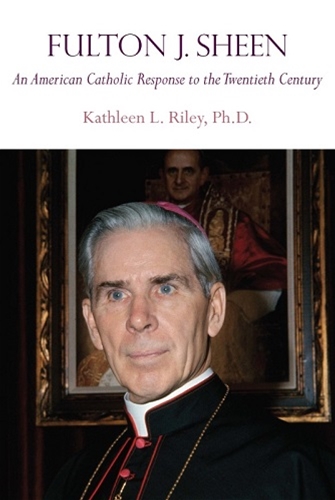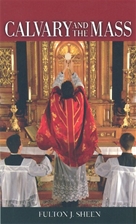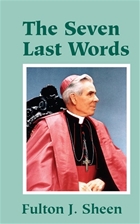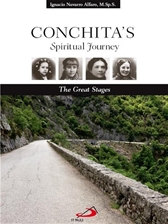Customer Reviews

FULTON J. SHEEN - Out of Stock
Description
FULTON J. SHEEN
An American Catholic Response to the Twentieth Century
Author: Kathleen L. Riley, PhD
Copyright: 2003
First Printed: 11-26-2003
| Also available as an E-book | ||||
| Amazon Kindle | Apple Book | Nook Book | ||
On September 9, 2002, Bishop Daniel R. Jenky, CSC, of the Diocese of Peoria, announced that the Vatican had accepted his petition to open the cause for the canonization of Fulton J. Sheen, an initiative which was begun in the year 2000 when John Cardinal O’Connor of New York approved a preliminary effort to advance the case for having “the greatest preacher and evangelist of the 20th century in the United States” be declared a saint. The cause for his canonization, according to Bishop Jenky, is based on Sheen’s personal sanctity and his reputation as a major figure in the history of American Catholicism. For 60 years ¾ from his ordination in 1919 to his death in 1979 ¾ Sheen spent his life working out a “Christian response to the challenge of the times.” As Thomistic philosopher and professor at the Catholic University of America, prolific writer, pioneer of the electronic gospel on radio and TV, convert-maker, head of the Society for the Propagation of the Faith and Bishop of Rochester in the aftermath of the Second Vatican Council, he lived in the religious spotlight for most of his life. His personal odyssey mirrored that of the Catholic Church in facing the challenges of the times: two world wars, national and international depression, fascism, nazism, communism, capitalism, the sexual revolution and the upheaval following the Council. An “American son born in our American heartland,” as Bishop Jenky called him, Sheen may one day enjoy the additional distinction of being the first American-born male saint. This thoroughly documented study was penned as a doctoral dissertation in 1988. All subsequent works have built on its scholarly and balanced insights.
About the Author: Kathleen Riley, a native of Lockport, New York, is an Associate Professor of History at Ohio Dominican University. She received her B.A. from Nazareth College of Rochester, and her M.A. and Ph.D. from the University of Notre Dame. She teaches a variety of courses in both the History and Humanities Programs at Ohio Dominican, including a course on American Religious History which focuses on Fulton Sheen as a major figure in the Post World War II Religious Revival in the United States. Returning to her native western New York roots during the summer months, she offers the course in American Religion at Canisius College in Buffalo as well, and is currently working on a book about her hometown: “Lockport: Historic Jewel of the Erie Canal”.
Book: 377 pages
ISBN: 978-0-8189-0915-3
Prod. Code: 0915-3
Reviews
"An American Catholic Response to the Twentieth Century is an appropriate subtitle, for this book is about Bishop Fulton J. Sheen, a man very much a symbol of the 20th century. Bishop Sheen, who gained popularity as the host of "Life Is Worth Living" one of the first regularly aired religious programs in the United States, was also known as a fierce objector to communism. The book spends half of its 320 pages detailing Bishop Sheen's seemingly one-man war against the red menace. Bishop Sheen used radio, television and books to denounce communism and promote the ambiguous concept of Catholic Action. Bishop Sheen "generalized in a philosophical vein, rather than emphasizing pure religious teachings, because he wanted to appeal to the largest possible audience," author Kathleen Riley writes. Bishop Sheen drew criticism over speaking in these general terms. After World War II, Bishop Sheen looked for another target to attack. He chose secularism, a sense of spirituality without God. He spoke out against psychoanalysis, which he thought could lead some away from the Church. He clarified his view in his book, Peace of Soul. He encouraged people in need to go to confession, which he called "the key to happiness in the modern world." The book spends little time on Bishop Sheen's period as the bishop of Rochester, which seems fitting as he retired after only three years. Nor does the author speak of Bishop Sheen's cause for canonization, which began in 2000. By the end of the book, Bishop Sheen comes across as someone who best served the Church as a spokesman who used the airwaves to spread the Gospel." --Patrick J. Buechi in Western New York Catholic, September 2004
Almost 25 years after his death, Archbishop Fulton J. Sheen still plays a role in the life of a Church he served faithfully more than 50 years as priest, bishop, teacher and preacher. His tapes, books and TV programs regularly appear in bookstores and on cable television. Some people are actively promoting the cause for his canonization. Ironically, while he was still living, some of them might have been vocal in protesting Bishop Sheen's theological stance as preacher, teacher of social justice and champion of the essential message of the Gospel: to preach the "good news" to the alienated. "Saints," Bishop Sheen once wrote, come in different guises "to break up the monotony of life." He would certainly qualify for sainthood by that definition!
Kathleen Riley provides a well-researched study (based on her doctoral dissertation) of the life of Fulton J. Sheen. Her years of graduate study at Notre Dame University and diligent research in the Sheen Archives in Rochester gave her the tools and insights to produce a first-rate biography of one of America's most popular and eloquent Roman Catholic bishops. In successive chapters, Riley demonstrates how this golden-tongued orator utilized a solid intellectual and spiritual foundation for his engaging approach to the education of university students and countless Americans of diverse theological backgrounds.
For many, Sheen was the encouraging voice of the Church during the years of the Depression; a voice of hope during the years of World War II; a voice of revival and call to conversion in the 1950s; a voice for the poor of the world in the 1960s; a voice that took on flesh in the three years as Bishop of Rochester; and a less audible voice of reflection in the years prior to his death in 1979. To understand better the public Bishop Sheen, Riley demonstrates his innate desire to use his natural talents for public speaking to make the complexities of philosophy and theology simple. At times he spoke for effect assuming that his listeners understood fully the underpinnings of his message. The early chapters of the book describe his training, especially at Louvain, his deserved reputation as a brilliant Thomistic philosopher in the classrooms of Catholic University and his increasing output as an author. These well-crafted chapters prepare us to watch Sheen's life unfold naturally as a teacher and preacher committed to making the "theory" of the classroom something really "worth living."
For me, Riley's analysis of Sheen's early academic years gives a perspective of what he was all about, especially when he arrived in Rochester to test his theology of Church and social justice. His new diocese had little personal understanding of the man. They knew nothing about him as a philosopher and they only assumed that he was an able administrator. Hitherto they had listened admiringly to his radio and television monologues, but naturally with no chance to inquire further from the speaker himself. Riley gently helps the reader to understand these dynamics.
Even if Sheen had remained a professor for budding philosophers and theologians, he would have made a significant contribution to the intellectual life of the Church. His choice to use the pulpits of churches, radio and television fulfilled an overwhelming need for him to use his intellectual aptitude to help ordinary people make sense out of their daily lives. The warm smile, the piercing eyes and the handsome demeanor served him well as a speaker who could embrace an audience as if he had a special message for each of his listeners.
Riley's compelling biography of Fulton J. Sheen judiciously guides the reader to a better understanding of who he was. Although a Catholic, he addressed millions of Americans of many faiths. He spoke; and he was heard. --Fr. William E. Graf is chair of the religious studies department at Rochester's St. John Fisher College and pastor of Fairport's Church of the Resurrection. This review appeared in the Rochester Diocesan newspaper.










